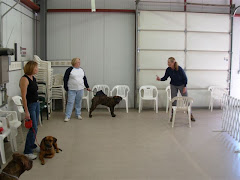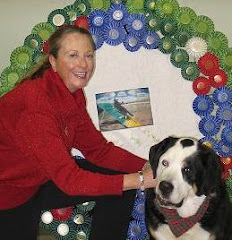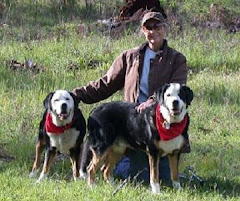First aid kits are great, but they're meant to be compact, mobile, and minimal in contents.
So our dogs' medicine cabinet probably wouldn't qualify.
Somewhere in our soon-to-be-unpacked new garage and basement are about five recycled Flint River Ranch dogfood boxes labeled "Dog Health Stuff." Close at hand are two other boxes labeled "People Health Stuff." Since there are more dogs than people in this household, I guess that's okay. Either that or we've created a bunch of canine hypochondriacs.
We're designating our spacious laundry/mud room as the "dog room." That's where they'll be fed, that's where they'll be bathed, and that's where we'll wipe off the muddy feet before they enter the house. That's also where the "Dog Health Stuff" boxes will get unloaded into upper and lower cabinets. Ah, to have ALL the dog stuff in one spot!
Along with spare leashes, toys, doggy raincoats and grooming tools will be the "first aid" stuff (and I suggest this list for any dog owner):
1. Vet Wrap, 2 dozen rolls of it
2. Gauze bandages
3. Triple Antibiotic ointment
4. Nolvasan wound cleaner
5. Elastikon (stretchy, sticky bandage), a dozen rolls of it
6. Gauze pads (squares)
7. Plenty of waterproof adhesive tape
8. Clean plastic bread bags to keep a bandaged leg or foot dry
9. Electric clippers to trim away hair from a wound area
10. Tweezers
11. Bandage scissors
12. Thermometer
13. Stethoscope
14. Soft muzzle
15. Hydrogen peroxide (to induce vomiting)
16. Bottled saline solution (for flushing wounds)
17. Latex gloves (for rectal exams)
18. A few clean rags
19. Paper towels
20. Gas-X and Mylanta (for relieving bloat)
21. Rubbing alcohol (for sterilizing instruments)
22. Q-Tips
23. A pair of hemostats (I don't know why and hope I never have to use them)
24. A compact flashlight (I use a Petzl headlamp which is WONDERFUL for hands-free light when you're trying to examine or treat a wound)
25. Bottle of pain reliever, like Rimadyl or Deramaxx (both prescription drugs), or plain aspirin.
26. Epsom salts for soaking an obvious sprain.
27. Several small, soft, clean sponges
28. Dog first aid handbook
29. Old, cheap fleece blanket
Now that's just the "first aid" stuff. And I've probably forgotten something. But then there's the "medicine chest" section, which includes:
1. Prescription drugs for each dog
2. Pro-enzyme powder for the Swissies' food (to prevent bloat)
3. Metamucil powder to add to the Swissies' food (aids in good, formed stool)
4. Daily vitamin pill containers, refilled weekly. (They probably don't need any of it, but it makes us feel good.) Supplements include fish oil, Vitamin C, Joint Rescue (wonderful glucosamine/anti-inflammatory pills), Vitamin E, sulphur pills (to help stave off the demodectic mange that plagued Lizzie as a puppy)
5. Anti-fungal cream
6. Ear wash
7. Nail clippers and styptic powder
8. Toothbrush and toothpaste
9. C.E.T. Dental Hygiene Chews
10. Bitter Apple spray
11. Anti-itch home-made lotion
12. Extra ingredients for the above (aloe, tea tree oil, witch hazel)
13. Sunscreen for Lizzie's face
14. Extra dog shampoo
15. "Dry" shampoo (for dire emergencies)
16. Doggy cologne (for even worse emergencies!)
17. Nature's Miracle
17. Nature's Miracle
18. All our old, ratty towels
19. Shedding blade and slicker brush
These items will be categorized and stashed in convenient, pull-out plastic tubs so it'll be easier to find stuff in a hurry and keep things neat.
Just the other day I realized that the DOGS have three times more ROOM for their "toiletries" in the laundry room than we do for our own stuff in the master bathroom. Good thing, since they have three times more STUFF! Hmmm....


















No comments:
Post a Comment